人教版 必修3 Unit 3 The Million Pound Bank Note Using Language Act I, Scene 4:At the restaurant (38张PPT
文档属性
| 名称 | 人教版 必修3 Unit 3 The Million Pound Bank Note Using Language Act I, Scene 4:At the restaurant (38张PPT | 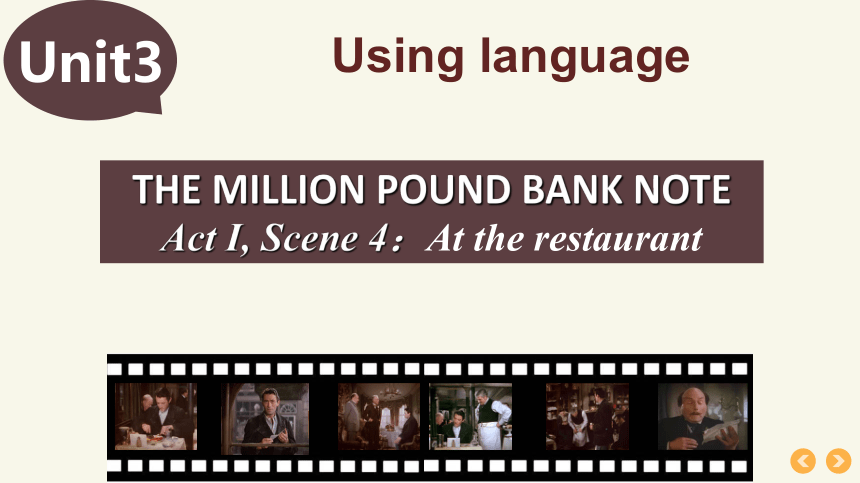 | |
| 格式 | zip | ||
| 文件大小 | 4.7MB | ||
| 资源类型 | 教案 | ||
| 版本资源 | 人教版(新课程标准) | ||
| 科目 | 英语 | ||
| 更新时间 | 2020-06-12 15:28:52 | ||
图片预览

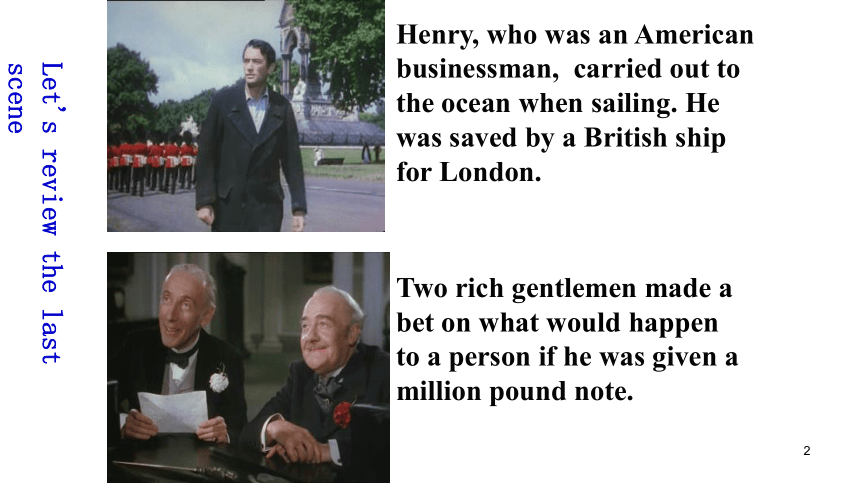
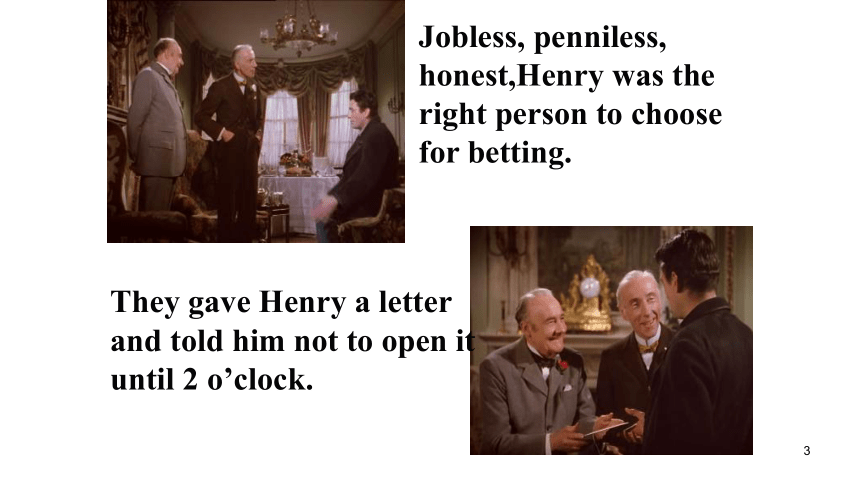
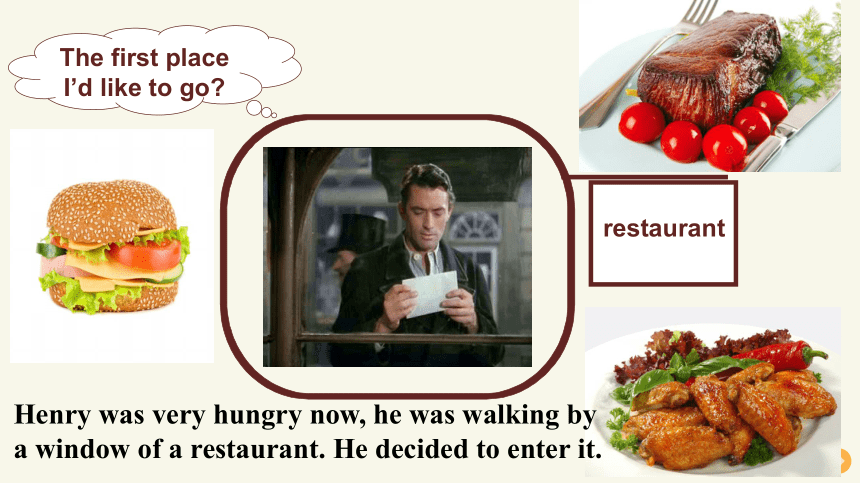
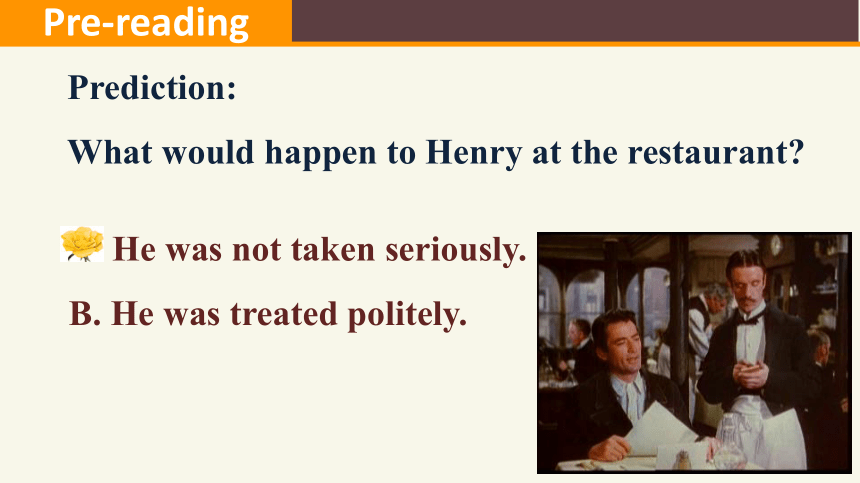
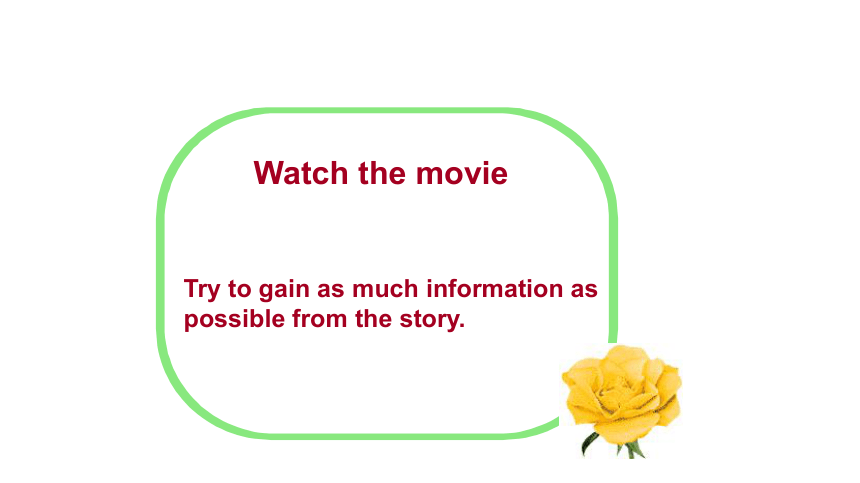


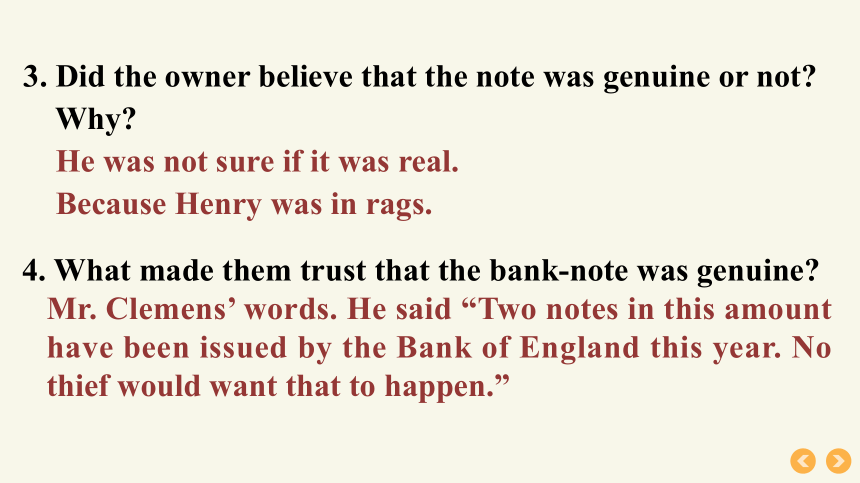
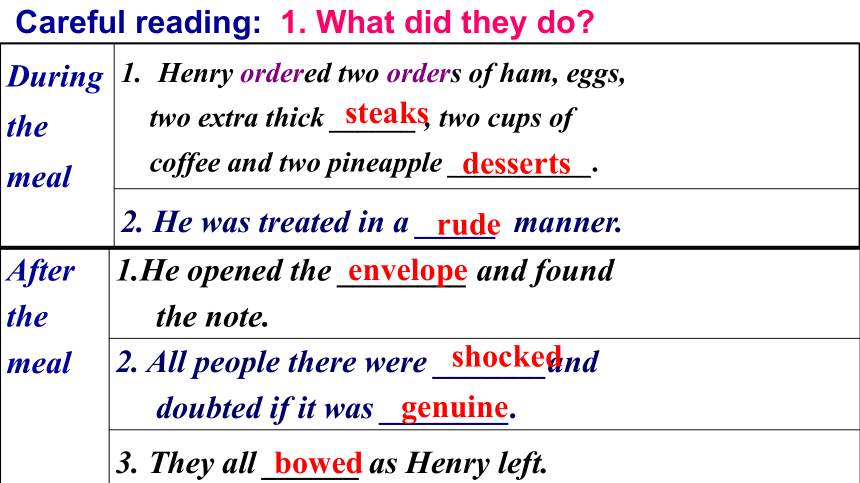


文档简介
(共38张PPT)
THE
MILLION
POUND
BANK
NOTE
Act
I,
Scene
4:At
the
restaurant
Unit3
Using
language
null
Two
rich
gentlemen
made
a
bet
on
what
would
happen
to
a
person
if
he
was
given
a
million
pound
note.
Henry,
who
was
an
American
businessman,
carried
out
to
the
ocean
when
sailing.
He
was
saved
by
a
British
ship
for
London.
Let's
review
the
last
scene
null
Jobless,
penniless,
honest,Henry
was
the
right
person
to
choose
for
betting.
They
gave
Henry
a
letter
and
told
him
not
to
open
it
until
2
o’clock.
The
first
place
I’d
like
to
go?
restaurant
Henry
was
very
hungry
now,
he
was
walking
by
a
window
of
a
restaurant.
He
decided
to
enter
it.
Pre-reading
Prediction:
What
would
happen
to
Henry
at
the
restaurant?
A.
He
was
not
taken
seriously.
B.
He
was
treated
politely.
Watch
the
movie
Try
to
gain
as
much
information
as
possible
from
the
story.
Fast
reading
Reading
True
or
False?
The
owner
looked
down
upon
Henry
when
he
noticed
Henry’s
appearance.
Henry
asked
for
more
of
the
same
food
because
he
is
an
American
who
like
to
eat
a
lot.
When
Henry
saw
the
million
pound
bank-note,
he
was
happy
and
proud
of
it.
The
owner
didn't
believe
that
the
bank-note
was
real
and
he
asked
Henry
to
get
out
of
the
restaurant.
T
F
F
F
Careful
reading
Reading
Read
and
answer
these
questions.
1.
What
was
it
in
the
letter?
A
million
pound
bank
note.
2.
Before
Henry
took
the
note
out
of
the
envelope,
did
the
waiter
serve
him
politely?
Why?
No,
he
didn’t.
He
served
Henry
impolitely.
Because
he
thought
Henry
was
a
poor
man
who
was
not
able
to
pay
the
meal.
3.
Did
the
owner
believe
that
the
note
was
genuine
or
not?
Why?
He
was
not
sure
if
it
was
real.
Because
Henry
was
in
rags.
4.
What
made
them
trust
that
the
bank-note
was
genuine?
Mr.
Clemens’
words.
He
said
“Two
notes
in
this
amount
have
been
issued
by
the
Bank
of
England
this
year.
No
thief
would
want
that
to
happen.”
During
the
meal
Henry
ordered
two
orders
of
ham,
eggs,
two
extra
thick
______
,
two
cups
of
coffee
and
two
pineapple
__________.
2.
He
was
treated
in
a
_____
manner.
steaks
desserts
rude
After
the
meal
He
opened
the
________
and
found
the
note.
2.
All
people
there
were
_______and
doubted
if
it
was
________.
3.
They
all
______
as
Henry
left.
envelope
shocked
genuine
bowed
Careful
reading:
1.
What
did
they
do?
Careful
reading
Reading
Pay
much
attention
to
the
different
attitudes
towards
Henry.
Before
Henry
shows
his
million
pound
bank-note
Owner
Hostess
Waiter
That
one’s
reserved.
Well,
we
will
have
to
take
a
chance.
…if
you
pay
the
bill…
My
goodness!
He
eats
like
a
wolf.
It’ll
cost
a
large
amount
of
money.
Again,
everything?
What’s
there
to
wait
for?
Rude
After
Henry
shows
his
million
pound
bank-note
Owner
Hostess
Waiter
I’m
so
sorry,
sir,
so
sorry.
Oh,
please,
don’t
worry,
sir.
Doesn’t
matter
at
all.
Just
having
you
sit
here
is
a
great
honour!
…bow
…
Screams
And
you
put
him
in
the
back
of
the
restaurant!
…bow
…
...bow…
Respectful
1.Whose
behavior
changes
most
during
this
scene?
What
causes
these
great
changes?
Rude
Respectful
2.
What?kind?of?person
is?the
owner
of
the
restaurant?
He?is?a
man?who?judges
a
person
by?his
appearance
and
how?much
money?the
person
has.
3.Choose
the
best
words
to
describe
the
restaurant
owner’s
attitudes
towards
Henry.
①
sympathetic
(同情的)
②
flattering
(奉承的)
③
unfriendly
/rude
④
respectful
(恭敬的)
When
asking
Henry
to
pay
the
bill,
he
is
_______.
When
he
finds
Henry
is
a
“millionaire”,
he
is
______.
③
②
④
What
can
we
learn
from
this
story?
We
shouldn’t
judge
people
by
appearance.
Money
is
everything
in
the
capitalist
society(资本主义社会)
.
1.Money
is
the
root
of
evil.
2.Money
makes
the
mare(母马;母驴)
go.
金钱是罪恶的根源。
有钱能使鬼推磨。
_______forced
him
to
go
into
a
restaurant.
The
owner
and
the
waiters
served
him
in
a
_____
manner.
However,
when
they
saw
the
note,
their
___________to
Henry
changed
greatly.
So
we
shouldn’t
_______
a
stranger
by
his
clothes
and
treat
him
according
to
his
_________.
Hunger
rude
attitudes
judge
Summary:
Retell
the
story
by
filling
in
the
blanks.
money
Post
reading
Language
points
Act
I,
Scene
4
(Outside
a
restaurant
Henry
looks
at
the
envelope
without
opening
it
and
decides
to
go
in.
He
sits
down
at
a
table
next
to
the
front
window.)
OWNER:
(seeing
Henry's
poor
appearance)
That
one's
reserved.
This
way,
please.
(to
the
waiter)
Take
this
gentleman's
order,
Horace.
HENRY:
(after
sitting
down
and
putting
the
letter
on
the
table)
I'd
like
some
ham
and
eggs
and
a
nice
big
steak.
Make
it
extra
thick.
I'd
also
like
a
cup
of
coffee
and
a
pineapple
dessert.
WAITER:
Right,
sir.
I'm
afraid
it'll
cost
a
large
amount
of
money.
HENRY:
I
understand.
And
I'll
have
a
large
glass
of
beer.
WAITER:
OK.
(The
waiter
leaves
and
soon
returns
with
all
the
food.)
Words
and
phrases
1.
I’m
afraid
it’ll
cost
a
large
amount
of
money.
amount
n.
1)
数量,
数额
a
large
amount
of
work
大量工作
2)
总额,
总数
He
could
only
pay
half
the
amount
he
owed.
他只偿还了所欠债务的一半。
v
.总计,合计,等于,相当于(amounted
,
amounting)
The
cost
amounted
to
250
pounds.
费用共达250英镑。
amount作主语的主谓一致
a
good/large
amount
of修饰不可数名词,作主语时,谓语动词用单数;good/large
amounts
of修饰不可数名词,作主语时,谓语动词用复数。
money
been
received.
=
money
been
received.
一大笔款到了。
A
great
amount
of
has
Great
amounts
of
have
活学活用
用所给词的适当形式填空。
①A
large
amount
of
material
_____(have)
been
collected
for
his
novel.
②There____(be)
large
amounts
of
information
which
is
of
great
use.
③The
total
expenses
have
________(amount)
to
a
thousand
yuan.
has
are
amounted
巧学助记
HOSTESS:
My
goodness!
Why,
look
at
him.
He
eats
like
a
wolf.
OWNER:
We'll
see
if
he's
clever
as
a
wolf,
eh?
HENRY:
(having
just
finished
every
bit
of
food)
Ah,
waiter.
(waiter
returns)
Same
thing
again,
please.
Oh,
and
another
beer.
WAITER:
Again?
Everything?
HENRY:
Yes,
that's
right.
(sees
the
look
on
the
waiter's
face)
Anything
wrong?
WAITER:
No,
not
at
all.
(to
the
owner)
He's
asked
for
more
of
the
same.
OWNER:
Well,
it
is
well-known
that
Americans
like
to
eat
a
lot.
Well,
we'll
have
to
take
a
chance.
Go
ahead
and
let
him
have
it.
WAITER:
(reading
the
bill
after
the
meal)
All
right.
That's
two
orders
of
ham
and
eggs,
two
extra
thick
steaks,
two
large
glasses
of
beer,
two
cups
of
coffee
and
two
desserts.
1.
Well,
it
is
well-known
that
Americans
like
to
eat
a
lot.
嗯,许多美国人喜欢吃得多,这是大家都知道的。
[点拨]
此句是一个主从复合句。主句为it
is
well-known;从句为that引导的主语从句,即that
Americans
like
to
eat
a
lot。
如:
It
is
certain
that
she
will
do
well
in
her
exam.
毫无疑问她考试成绩会很好。
It
is
probable
that
he
told
her
everything.
很可能他把一切都告诉她了。
[即学即用]
翻译下列句子。
1)
据说格林先生是由他的祖父母抚养成人的。
It
is
said
that
Mr.
Green
was
brought
up
by
his
grandparents.
2)
很遗憾她父亲不允许她跟我们一起去。
It’s
a
pity
that
her
father
didn’t
permit
her
to
go
with
us.
HENRY:
(looking
at
the
clock
on
the
wall)
Would
you
mind
waiting
just
a
few
minutes?
WAITER:
(in
a
rude
manner)
What's
there
to
wait
for?
OWNER:
All
right,
Horace.
I'll
take
care
of
this.
HENRY:
(to
owner)
That
was
a
wonderful
meal.
It's
amazing
how
much
pleasure
you
get
out
of
the
simple
things
in
life,
especially
if
you
can't
have
them
for
a
while.
OWNER:
Yes,
very
interesting.
Now
perhaps,
sir,
if
you
pay
your
bill
I
can
help
the
other
customers.
HENRY:
(looking
at
the
clock
on
the
wall
again)
Well,
I
see
it's
two
o'clock.
(he
opens
the
envelope
and
holds
a
million
pound
bank
note
in
his
hands.
Henry
is
surprised
but
the
owner
and
waiter
are
shocked)
I'm
very
sorry.
But
...
I
...
I
don't
have
anything
smaller.
2
.rude
adj.粗鲁的,不礼貌的
①Don't
be
so
rude
to
your
parents!
别对你的父母这么没礼貌!
②It
was
rude
of
you
to
shout
at
that
old
lady
like
that.你那样对那位老太太大喊大叫是没礼貌的。
归纳拓展
对某人无礼/粗鲁
(对某人来说)做某事是粗鲁的/无礼的
be
rude
to
sb
It
is/was
rude(of
sb.)to
do
sth.
It+be+adj+of
sb
to
do
sth(描述人品质的形容词如:good/kind/nice/friendly/clever/polite/stupid/lazy/foolish/brave/cruel/honest等)
活学活用
完成句子。
①____________________________the
customer
like
that.
那位女售货员那样跟顾客说话太无礼了。
②He
____________
me.
他对我无礼。
③He
________________.
他举止粗鲁。
It
was
rude
of
the
salesgirl
to
talk
to
is
rude
to
is
rude
in
manner
OWNER:
(still
shocked
and
nervous)
Well
..
er
...
just
one
moment.
Maggie,
look!
(the
hostess
screams,
the
other
customers
look
at
her
and
she
puts
a
hand
to
her
mouth)
Do
you
think
it's
genuine?
HOSTESS:
Oh,
dear,
I
don't
know.
I
simply
don't
know.
OWNER:
Well,
I
did
hear
that
the
Bank
of
England
had
issued
two
notes
in
this
amount
...
Anyway,
I
don't
think
it
can
be
a
fake.
People
would
pay
too
much
attention
to
a
bank
note
of
this
amount.
No
thief
would
want
that
to
happen.
HOSTESS:
But
he's
in
rags!
OWNER:
Perhaps
he's
a
very
strange,
rich
man.
(as
if
he
has
discovered
something
for
the
first
time)
Why,
yes!
That
must
be
it!
HOSTESS:
(hits
her
husband's
arm)
And
you
put
him
in
the
back
of
the
restaurant!
Go
and
see
him
at
once.
OWNER:
(to
Henry)
I'm
so
sorry,
sir,
so
sorry,
but
I
cannot
change
this
bank
note.
HENRY:
But
it's
all
I
have
on
me.
OWNER:
Oh,
please,
don't
worry,
sir.
Doesn't
matter
at
all.
We're
so
very
glad
that
you
even
entered
our
little
eating
place.
Indeed,
sir,
I
hope
you'll
come
here
whenever
you
like.
HENRY:
Well,
that's
very
kind
of
you.
OWNER:
Kind,
sir?
No,
it's
kind
of
you.
You
must
come
whenever
you
want
and
have
whatever
you
like.
Just
having
you
sit
here
is
a
great
honour!
As
for
the
bill,
sir,
please
forget
it.
HENRY:
Forget
it?
Well
...
thank
you
very
much.
That's
very
nice
of
you.
OWNER:
Oh,
it's
for
us
to
thank
you,
sir
and
I
do,
sir,
from
the
bottom
of
my
heart.
(The
owner,
hostess
and
waiter
all
bow
as
Henry
leaves.)
Indeed,
sir.
I
hope
you'll
come
here
whenever
you
like.真的,先生,我希望您想来的时候,您就来。
(1)此句为主从复合句。
(2)“you‘ll
come
here
whenever
you
like”为省掉“that”的宾语从句,且从句中含“whenever”引导的让步状语从句。
(3)whenever意为“在任何时候,无论何时”.此时可与no
matter
when互换(让步状语从句)。
Whenever(=No
matter
when)
you
want
to
travel
,
I
will
go
with
you.
无论何时你想去旅行,我会和你一起去。
Whenever
we
will
go
is
up
to
you.
主语从句
单项填空。
________
I
have
to
give
a
speech,
I
get
extremely
nervous
before
I
start.
A.Whatever
B.Whenever
C.Whoever
D.However
答案:B 本题考查状语从句。句意:每当我要演讲的时候,我都会在开始之前感到特别的紧张。
3.As
for
the
bill,
sir,
please
forget
it.
as
for至于;关于
①As
for
the
hotel,
it
was
very
uncomfortable
and
miles
from
the
sea.
至于旅馆,非常不舒服,而且离海边有好几英里远。
②As
for
you,
you
ought
to
be
ashamed
of
yourself.
至于你,你应该感到惭愧。
名师点拨
as
for意为“至于,就……而论”,常用来对已经谈过的事情作进一步的说明或引起人们对句中所谈事情的注意。其后可接名词、代词、动名词。
归纳拓展
as
if/though
好像;仿佛
as/so
long
as
只要
as
a
whole
作为一个整体来看
as
a
matter
of
fact
事实上;
实际上
as
follows
如下
as
well(as)
也,
和……一样
活学活用
完成句子。
①_______,she
has
nothing
to
complain
about.
至于她,她没有什么可抱怨的。
②______________—that
is
quite
out
of
the
question.
至于说回去——那完全是不可能的。
③______________,no
student
may
enter
the
headmaster's
office
without
permission.
从明天起,任何学生未经许可不得进入校长办公室。
④她待我形同路人。
_________________________________________
As
for
her
As
for
going
back
As
from
tomorrow
She
treats
me
as
if/though
I
were
a
stranger.
THE
MILLION
POUND
BANK
NOTE
Act
I,
Scene
4:At
the
restaurant
Unit3
Using
language
null
Two
rich
gentlemen
made
a
bet
on
what
would
happen
to
a
person
if
he
was
given
a
million
pound
note.
Henry,
who
was
an
American
businessman,
carried
out
to
the
ocean
when
sailing.
He
was
saved
by
a
British
ship
for
London.
Let's
review
the
last
scene
null
Jobless,
penniless,
honest,Henry
was
the
right
person
to
choose
for
betting.
They
gave
Henry
a
letter
and
told
him
not
to
open
it
until
2
o’clock.
The
first
place
I’d
like
to
go?
restaurant
Henry
was
very
hungry
now,
he
was
walking
by
a
window
of
a
restaurant.
He
decided
to
enter
it.
Pre-reading
Prediction:
What
would
happen
to
Henry
at
the
restaurant?
A.
He
was
not
taken
seriously.
B.
He
was
treated
politely.
Watch
the
movie
Try
to
gain
as
much
information
as
possible
from
the
story.
Fast
reading
Reading
True
or
False?
The
owner
looked
down
upon
Henry
when
he
noticed
Henry’s
appearance.
Henry
asked
for
more
of
the
same
food
because
he
is
an
American
who
like
to
eat
a
lot.
When
Henry
saw
the
million
pound
bank-note,
he
was
happy
and
proud
of
it.
The
owner
didn't
believe
that
the
bank-note
was
real
and
he
asked
Henry
to
get
out
of
the
restaurant.
T
F
F
F
Careful
reading
Reading
Read
and
answer
these
questions.
1.
What
was
it
in
the
letter?
A
million
pound
bank
note.
2.
Before
Henry
took
the
note
out
of
the
envelope,
did
the
waiter
serve
him
politely?
Why?
No,
he
didn’t.
He
served
Henry
impolitely.
Because
he
thought
Henry
was
a
poor
man
who
was
not
able
to
pay
the
meal.
3.
Did
the
owner
believe
that
the
note
was
genuine
or
not?
Why?
He
was
not
sure
if
it
was
real.
Because
Henry
was
in
rags.
4.
What
made
them
trust
that
the
bank-note
was
genuine?
Mr.
Clemens’
words.
He
said
“Two
notes
in
this
amount
have
been
issued
by
the
Bank
of
England
this
year.
No
thief
would
want
that
to
happen.”
During
the
meal
Henry
ordered
two
orders
of
ham,
eggs,
two
extra
thick
______
,
two
cups
of
coffee
and
two
pineapple
__________.
2.
He
was
treated
in
a
_____
manner.
steaks
desserts
rude
After
the
meal
He
opened
the
________
and
found
the
note.
2.
All
people
there
were
_______and
doubted
if
it
was
________.
3.
They
all
______
as
Henry
left.
envelope
shocked
genuine
bowed
Careful
reading:
1.
What
did
they
do?
Careful
reading
Reading
Pay
much
attention
to
the
different
attitudes
towards
Henry.
Before
Henry
shows
his
million
pound
bank-note
Owner
Hostess
Waiter
That
one’s
reserved.
Well,
we
will
have
to
take
a
chance.
…if
you
pay
the
bill…
My
goodness!
He
eats
like
a
wolf.
It’ll
cost
a
large
amount
of
money.
Again,
everything?
What’s
there
to
wait
for?
Rude
After
Henry
shows
his
million
pound
bank-note
Owner
Hostess
Waiter
I’m
so
sorry,
sir,
so
sorry.
Oh,
please,
don’t
worry,
sir.
Doesn’t
matter
at
all.
Just
having
you
sit
here
is
a
great
honour!
…bow
…
Screams
And
you
put
him
in
the
back
of
the
restaurant!
…bow
…
...bow…
Respectful
1.Whose
behavior
changes
most
during
this
scene?
What
causes
these
great
changes?
Rude
Respectful
2.
What?kind?of?person
is?the
owner
of
the
restaurant?
He?is?a
man?who?judges
a
person
by?his
appearance
and
how?much
money?the
person
has.
3.Choose
the
best
words
to
describe
the
restaurant
owner’s
attitudes
towards
Henry.
①
sympathetic
(同情的)
②
flattering
(奉承的)
③
unfriendly
/rude
④
respectful
(恭敬的)
When
asking
Henry
to
pay
the
bill,
he
is
_______.
When
he
finds
Henry
is
a
“millionaire”,
he
is
______.
③
②
④
What
can
we
learn
from
this
story?
We
shouldn’t
judge
people
by
appearance.
Money
is
everything
in
the
capitalist
society(资本主义社会)
.
1.Money
is
the
root
of
evil.
2.Money
makes
the
mare(母马;母驴)
go.
金钱是罪恶的根源。
有钱能使鬼推磨。
_______forced
him
to
go
into
a
restaurant.
The
owner
and
the
waiters
served
him
in
a
_____
manner.
However,
when
they
saw
the
note,
their
___________to
Henry
changed
greatly.
So
we
shouldn’t
_______
a
stranger
by
his
clothes
and
treat
him
according
to
his
_________.
Hunger
rude
attitudes
judge
Summary:
Retell
the
story
by
filling
in
the
blanks.
money
Post
reading
Language
points
Act
I,
Scene
4
(Outside
a
restaurant
Henry
looks
at
the
envelope
without
opening
it
and
decides
to
go
in.
He
sits
down
at
a
table
next
to
the
front
window.)
OWNER:
(seeing
Henry's
poor
appearance)
That
one's
reserved.
This
way,
please.
(to
the
waiter)
Take
this
gentleman's
order,
Horace.
HENRY:
(after
sitting
down
and
putting
the
letter
on
the
table)
I'd
like
some
ham
and
eggs
and
a
nice
big
steak.
Make
it
extra
thick.
I'd
also
like
a
cup
of
coffee
and
a
pineapple
dessert.
WAITER:
Right,
sir.
I'm
afraid
it'll
cost
a
large
amount
of
money.
HENRY:
I
understand.
And
I'll
have
a
large
glass
of
beer.
WAITER:
OK.
(The
waiter
leaves
and
soon
returns
with
all
the
food.)
Words
and
phrases
1.
I’m
afraid
it’ll
cost
a
large
amount
of
money.
amount
n.
1)
数量,
数额
a
large
amount
of
work
大量工作
2)
总额,
总数
He
could
only
pay
half
the
amount
he
owed.
他只偿还了所欠债务的一半。
v
.总计,合计,等于,相当于(amounted
,
amounting)
The
cost
amounted
to
250
pounds.
费用共达250英镑。
amount作主语的主谓一致
a
good/large
amount
of修饰不可数名词,作主语时,谓语动词用单数;good/large
amounts
of修饰不可数名词,作主语时,谓语动词用复数。
money
been
received.
=
money
been
received.
一大笔款到了。
A
great
amount
of
has
Great
amounts
of
have
活学活用
用所给词的适当形式填空。
①A
large
amount
of
material
_____(have)
been
collected
for
his
novel.
②There____(be)
large
amounts
of
information
which
is
of
great
use.
③The
total
expenses
have
________(amount)
to
a
thousand
yuan.
has
are
amounted
巧学助记
HOSTESS:
My
goodness!
Why,
look
at
him.
He
eats
like
a
wolf.
OWNER:
We'll
see
if
he's
clever
as
a
wolf,
eh?
HENRY:
(having
just
finished
every
bit
of
food)
Ah,
waiter.
(waiter
returns)
Same
thing
again,
please.
Oh,
and
another
beer.
WAITER:
Again?
Everything?
HENRY:
Yes,
that's
right.
(sees
the
look
on
the
waiter's
face)
Anything
wrong?
WAITER:
No,
not
at
all.
(to
the
owner)
He's
asked
for
more
of
the
same.
OWNER:
Well,
it
is
well-known
that
Americans
like
to
eat
a
lot.
Well,
we'll
have
to
take
a
chance.
Go
ahead
and
let
him
have
it.
WAITER:
(reading
the
bill
after
the
meal)
All
right.
That's
two
orders
of
ham
and
eggs,
two
extra
thick
steaks,
two
large
glasses
of
beer,
two
cups
of
coffee
and
two
desserts.
1.
Well,
it
is
well-known
that
Americans
like
to
eat
a
lot.
嗯,许多美国人喜欢吃得多,这是大家都知道的。
[点拨]
此句是一个主从复合句。主句为it
is
well-known;从句为that引导的主语从句,即that
Americans
like
to
eat
a
lot。
如:
It
is
certain
that
she
will
do
well
in
her
exam.
毫无疑问她考试成绩会很好。
It
is
probable
that
he
told
her
everything.
很可能他把一切都告诉她了。
[即学即用]
翻译下列句子。
1)
据说格林先生是由他的祖父母抚养成人的。
It
is
said
that
Mr.
Green
was
brought
up
by
his
grandparents.
2)
很遗憾她父亲不允许她跟我们一起去。
It’s
a
pity
that
her
father
didn’t
permit
her
to
go
with
us.
HENRY:
(looking
at
the
clock
on
the
wall)
Would
you
mind
waiting
just
a
few
minutes?
WAITER:
(in
a
rude
manner)
What's
there
to
wait
for?
OWNER:
All
right,
Horace.
I'll
take
care
of
this.
HENRY:
(to
owner)
That
was
a
wonderful
meal.
It's
amazing
how
much
pleasure
you
get
out
of
the
simple
things
in
life,
especially
if
you
can't
have
them
for
a
while.
OWNER:
Yes,
very
interesting.
Now
perhaps,
sir,
if
you
pay
your
bill
I
can
help
the
other
customers.
HENRY:
(looking
at
the
clock
on
the
wall
again)
Well,
I
see
it's
two
o'clock.
(he
opens
the
envelope
and
holds
a
million
pound
bank
note
in
his
hands.
Henry
is
surprised
but
the
owner
and
waiter
are
shocked)
I'm
very
sorry.
But
...
I
...
I
don't
have
anything
smaller.
2
.rude
adj.粗鲁的,不礼貌的
①Don't
be
so
rude
to
your
parents!
别对你的父母这么没礼貌!
②It
was
rude
of
you
to
shout
at
that
old
lady
like
that.你那样对那位老太太大喊大叫是没礼貌的。
归纳拓展
对某人无礼/粗鲁
(对某人来说)做某事是粗鲁的/无礼的
be
rude
to
sb
It
is/was
rude(of
sb.)to
do
sth.
It+be+adj+of
sb
to
do
sth(描述人品质的形容词如:good/kind/nice/friendly/clever/polite/stupid/lazy/foolish/brave/cruel/honest等)
活学活用
完成句子。
①____________________________the
customer
like
that.
那位女售货员那样跟顾客说话太无礼了。
②He
____________
me.
他对我无礼。
③He
________________.
他举止粗鲁。
It
was
rude
of
the
salesgirl
to
talk
to
is
rude
to
is
rude
in
manner
OWNER:
(still
shocked
and
nervous)
Well
..
er
...
just
one
moment.
Maggie,
look!
(the
hostess
screams,
the
other
customers
look
at
her
and
she
puts
a
hand
to
her
mouth)
Do
you
think
it's
genuine?
HOSTESS:
Oh,
dear,
I
don't
know.
I
simply
don't
know.
OWNER:
Well,
I
did
hear
that
the
Bank
of
England
had
issued
two
notes
in
this
amount
...
Anyway,
I
don't
think
it
can
be
a
fake.
People
would
pay
too
much
attention
to
a
bank
note
of
this
amount.
No
thief
would
want
that
to
happen.
HOSTESS:
But
he's
in
rags!
OWNER:
Perhaps
he's
a
very
strange,
rich
man.
(as
if
he
has
discovered
something
for
the
first
time)
Why,
yes!
That
must
be
it!
HOSTESS:
(hits
her
husband's
arm)
And
you
put
him
in
the
back
of
the
restaurant!
Go
and
see
him
at
once.
OWNER:
(to
Henry)
I'm
so
sorry,
sir,
so
sorry,
but
I
cannot
change
this
bank
note.
HENRY:
But
it's
all
I
have
on
me.
OWNER:
Oh,
please,
don't
worry,
sir.
Doesn't
matter
at
all.
We're
so
very
glad
that
you
even
entered
our
little
eating
place.
Indeed,
sir,
I
hope
you'll
come
here
whenever
you
like.
HENRY:
Well,
that's
very
kind
of
you.
OWNER:
Kind,
sir?
No,
it's
kind
of
you.
You
must
come
whenever
you
want
and
have
whatever
you
like.
Just
having
you
sit
here
is
a
great
honour!
As
for
the
bill,
sir,
please
forget
it.
HENRY:
Forget
it?
Well
...
thank
you
very
much.
That's
very
nice
of
you.
OWNER:
Oh,
it's
for
us
to
thank
you,
sir
and
I
do,
sir,
from
the
bottom
of
my
heart.
(The
owner,
hostess
and
waiter
all
bow
as
Henry
leaves.)
Indeed,
sir.
I
hope
you'll
come
here
whenever
you
like.真的,先生,我希望您想来的时候,您就来。
(1)此句为主从复合句。
(2)“you‘ll
come
here
whenever
you
like”为省掉“that”的宾语从句,且从句中含“whenever”引导的让步状语从句。
(3)whenever意为“在任何时候,无论何时”.此时可与no
matter
when互换(让步状语从句)。
Whenever(=No
matter
when)
you
want
to
travel
,
I
will
go
with
you.
无论何时你想去旅行,我会和你一起去。
Whenever
we
will
go
is
up
to
you.
主语从句
单项填空。
________
I
have
to
give
a
speech,
I
get
extremely
nervous
before
I
start.
A.Whatever
B.Whenever
C.Whoever
D.However
答案:B 本题考查状语从句。句意:每当我要演讲的时候,我都会在开始之前感到特别的紧张。
3.As
for
the
bill,
sir,
please
forget
it.
as
for至于;关于
①As
for
the
hotel,
it
was
very
uncomfortable
and
miles
from
the
sea.
至于旅馆,非常不舒服,而且离海边有好几英里远。
②As
for
you,
you
ought
to
be
ashamed
of
yourself.
至于你,你应该感到惭愧。
名师点拨
as
for意为“至于,就……而论”,常用来对已经谈过的事情作进一步的说明或引起人们对句中所谈事情的注意。其后可接名词、代词、动名词。
归纳拓展
as
if/though
好像;仿佛
as/so
long
as
只要
as
a
whole
作为一个整体来看
as
a
matter
of
fact
事实上;
实际上
as
follows
如下
as
well(as)
也,
和……一样
活学活用
完成句子。
①_______,she
has
nothing
to
complain
about.
至于她,她没有什么可抱怨的。
②______________—that
is
quite
out
of
the
question.
至于说回去——那完全是不可能的。
③______________,no
student
may
enter
the
headmaster's
office
without
permission.
从明天起,任何学生未经许可不得进入校长办公室。
④她待我形同路人。
_________________________________________
As
for
her
As
for
going
back
As
from
tomorrow
She
treats
me
as
if/though
I
were
a
stranger.
同课章节目录
